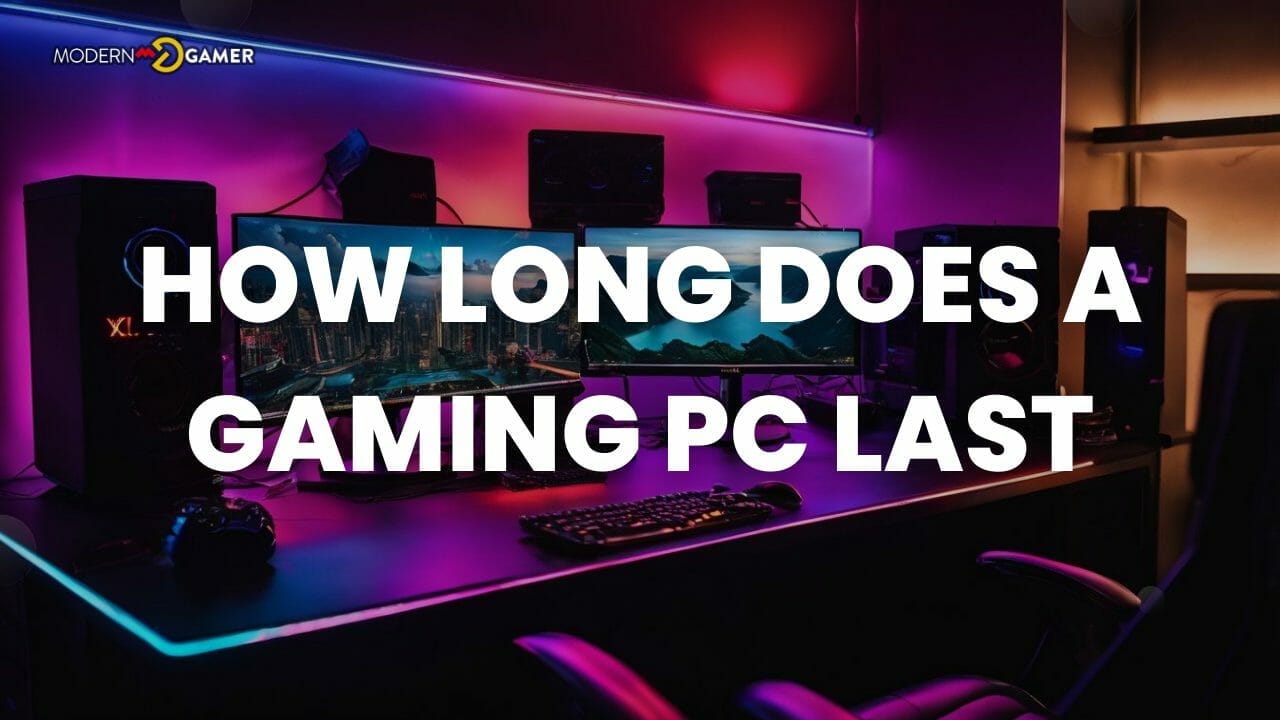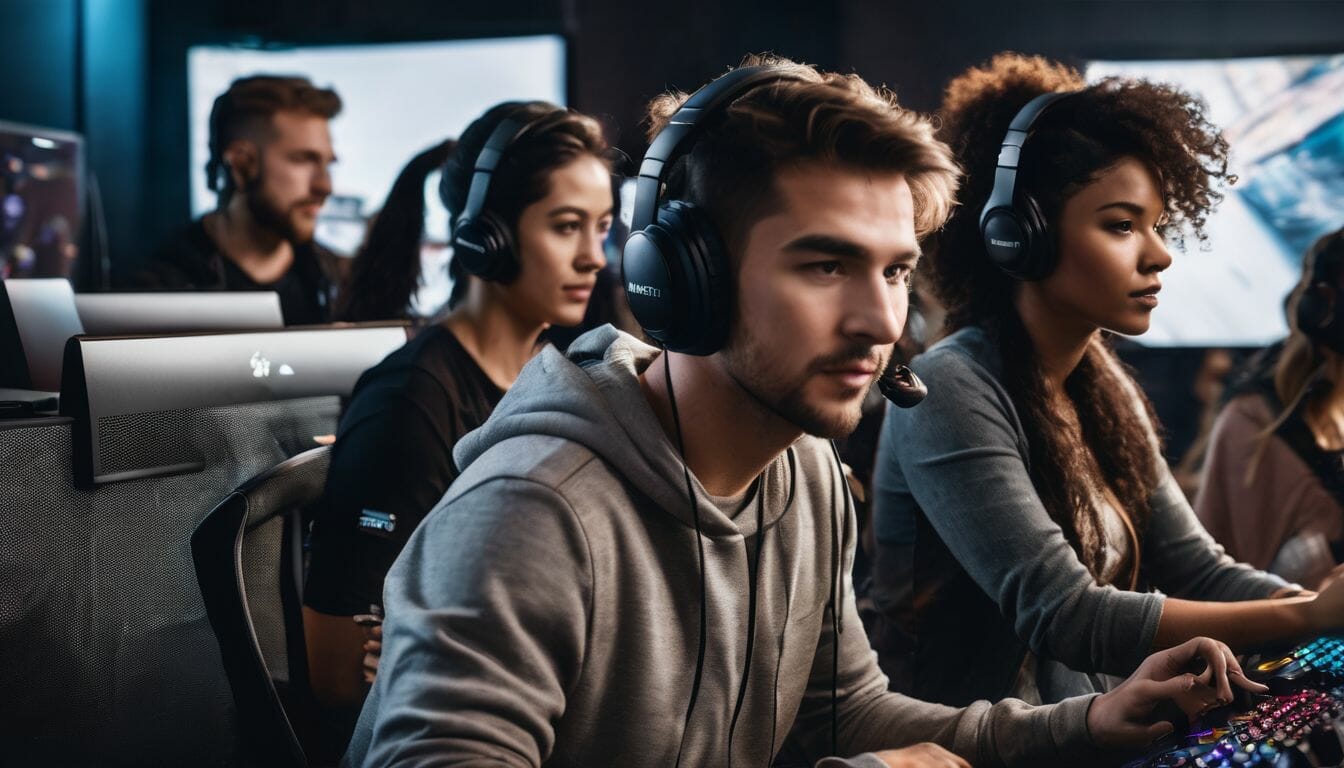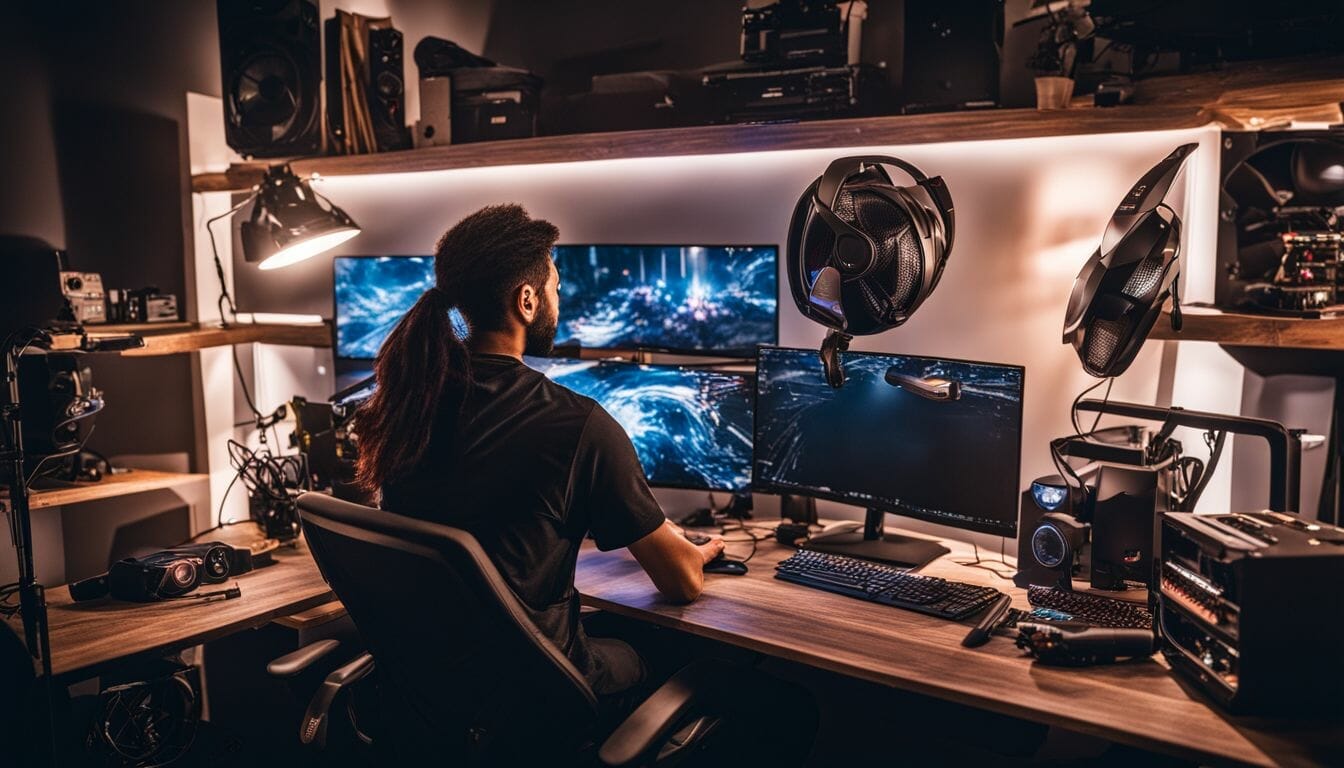How Long Does a Gaming PC Typically Last?

Curious about the lifespan of your gaming PC? Your interest in the broad range of lifespan estimates has been noted, as predictions can range dramatically from 2 to 10 years. Utilizing our expertise and thorough investigations, we aim to clarify this matter for you.
Keep reading as we unravel the lifespan of different types of gaming PCs, factors that affect their durability, and tips for extending their life – all to keep you in the game longer!
Key Takeaways
- The lifespan of a gaming PC can vary depending on its category. Low-end gaming PCs typically last around 2-3 years, mid-end gaming PCs can last between 3-5 years, and high-end gaming PCs have an average lifespan of 5-7 years.
- Pre-built high-end gaming PCs can last for 7-10 years with proper maintenance and upgrades over time.
- Factors that affect the lifespan of a gaming PC include managing overclocking frequency, controlling CPU temperature, regular registry cleaning, downloading from trusted sources, and hardware upgrades.
- Tips for extending the lifespan of a gaming PC include following proper overclocking practices, using effective cooling solutions, performing regular maintenance and cleaning, and practicing safe software practices.
Lifespan of Different Gaming PC Categories

The lifespan of a gaming PC can vary depending on the category it falls into. Low-end gaming PCs typically last around 2-3 years, mid-end gaming PCs can last between 3-5 years, and high-end gaming PCs have an average lifespan of 5-7 years.
Pre-built gaming PCs tend to have the longest lifespan, lasting up to 10 years with proper maintenance and upgrades over time.
Low-End Gaming PC (2-3 years)
We all know budget gaming PCs are good for saving money. They cost less but only last around 2 to 3 years. The parts in these low-end systems may not go beyond three years. Why? They have the weakest specs.
So, they can’t handle new games after a while. We need to upgrade them so we can keep playing the latest stuff. Gaming on such PCs gives us fun and joy for a couple of years at least!
Mid-End Gaming PC (3-5 years)
Mid-end gaming PCs rule for 3-5 years. The longevity of these midrange systems sits in the center spot. They can last longer than lowbudget gaming PCs but still fall behind high-end models.
This is due to their hardware lifespan and how well they handle new games.
These machines have better parts or components than the low-end ones do. As we take care of our gaming PC, we can get an average duration of around 5 years from it before its performance degeneration occurs.
However, that’s not a set-in-stone time frame either! If we keep up with updating or changing out older parts as needed, it could go on even longer. So, a mid-end system offers nice middle ground between cost and performance.
High-End Gaming PC (5-7 years)
High-end gaming PCs are built to last. They have a lifespan of about 5 to 7 years. But, they can go up to 10 years with the right care and part replacements. These PCs pack strong parts that handle games well for many years.
Yet, after some time, their performance may dip without updates or new parts. So, gamers should plan on upgrading certain components at this stage. This helps keep the PC working well past its initial span of seven to ten years.
We all expect our gaming tools to stay strong for long periods without change, but sometimes upgrades become necessary over time.
Pre-Built Gaming PC (7-10 years)
Pre-built gaming PCs with high-end specs can last for a good 7 to 10 years if we make sure to upgrade certain hardware components as needed. These pre-built PCs come with powerful processors, graphics cards, and other important parts already installed, so they are designed to handle demanding games for a longer time.
But it’s important to keep in mind that new games and technologies will come out over the years, so upgrading certain components like the graphics card or adding more RAM might be necessary to keep up.
With proper maintenance and the occasional upgrade, a pre-built gaming PC can provide many years of enjoyable gaming experiences.
Factors Affecting Gaming PC Lifespan

Several factors can significantly impact the lifespan of a gaming PC, including managing overclocking frequency, controlling CPU temperature, regular registry cleaning, downloading from trusted sources, and hardware upgrades.
Read on to learn more about these essential considerations.
Overclocking frequency management
Properly managing the overclocking frequency of your gaming PC is crucial for its longevity. Overclocking, which boosts CPU and GPU performance, can have an impact on their lifespan.
It’s important to keep an eye on the frequencies and make sure they’re within safe limits. By monitoring and controlling the overclocking frequency, you can prevent excessive strain on your components.
This helps extend their lifespan and ensures that your gaming PC performs optimally for a longer period of time. Remember, taking care of the frequency control measures will help in maximizing the lifespan of your CPU and GPU while enjoying improved gaming performance.
CPU temperature control
Proper CPU temperature control is crucial for keeping your gaming PC running smoothly and lasting longer. When the CPU gets too hot, it can cause performance issues and even shorten the lifespan of your computer.
To prevent this, you need to make sure that your cooling system is effective and efficient. Regular cleaning of dust from fans and heat sinks helps maintain good airflow, which keeps temperatures down.
Additionally, using thermal paste on the CPU cooler can improve heat transfer and keep temperatures in check. Remember to monitor your CPU temperature regularly to ensure it stays within safe limits.
Regular registry cleaning
Regular registry cleaning is an important factor in extending the lifespan of a gaming PC. By performing routine maintenance and cleaning, you can keep your gaming PC running smoothly and prevent any unnecessary issues or slowdowns.
This involves optimizing your computer’s registry, which is like its internal database that stores important settings and information. Regularly cleaning the registry helps remove any unnecessary or invalid entries, improving overall performance and stability.
So, don’t forget to include regular registry cleaning as part of your gaming PC maintenance routine to ensure it stays in top condition for years to come.
Downloading from trusted sources
When downloading games and software for your gaming PC, it’s crucial to choose trusted sources. This is because downloading from unreliable or sketchy websites can have a negative impact on the lifespan of your PC.
You see, these untrusted downloads may contain viruses, malware, or other harmful programs that can damage your PC’s hardware or slow down its performance. To ensure the longevity of your gaming PC, opt for reputable websites and platforms that are known for providing safe and secure downloads.
By doing so, you’ll minimize the risk of encountering issues that could shorten the lifespan of your beloved gaming rig.
Hardware upgrades
Hardware upgrades are an important factor in extending the lifespan of a gaming PC. As technology evolves, new hardware components with better performance and capabilities become available.
Upgrading your graphics card, for example, can enhance your gaming experience by improving visual quality and reducing lag. Additionally, upgrading your CPU can boost overall system performance and help keep up with the demands of newer games.
Regularly updating hardware not only ensures compatibility but also allows you to take advantage of the latest advancements in gaming technology. By staying current with hardware improvements, you can extend the longevity of your gaming computer and continue enjoying high-quality gaming experiences for years to come.
Tips to Extend Gaming PC Lifespan
To extend the lifespan of your gaming PC, follow proper overclocking practices, use effective cooling solutions, perform regular maintenance and cleaning, and practice safe software practices.
Read on to learn more about how to keep your gaming PC running smoothly for years to come.
Proper overclocking practices
To ensure the longevity of your gaming PC, it’s important to follow proper overclocking practices. Overclocking can give a performance boost to your CPU and GPU, allowing you to enjoy games at higher settings.
However, it’s essential to be cautious because excessive overclocking can decrease the lifespan of these components. It’s recommended to use reliable tools like MSI Afterburner for overclocking CPUs.
Additionally, make sure that you have effective cooling solutions in place to prevent overheating. Regular maintenance and cleaning are also crucial for keeping your gaming PC running smoothly.
Effective cooling solutions
Proper cooling is crucial for keeping your gaming PC running smoothly and extending its lifespan. Excessive heat can damage the components inside your PC, leading to performance issues or even complete failure.
That’s why it’s important to invest in effective cooling solutions. Fans, liquid cooling systems, and heat sinks are all great options for dissipating heat and maintaining optimal temperatures.
Regularly cleaning your PC’s cooling system by dusting off fans and vents will also help prevent overheating. By investing in high-quality cooling components and practicing good maintenance habits, you can ensure that your gaming PC stays cool, performs at its best, and lasts longer.
Regular maintenance and cleaning
Regular maintenance and cleaning are essential for keeping your gaming PC running smoothly and extending its lifespan. Dust can accumulate inside your PC over time, clogging up fans and vents, which can lead to overheating and reduced performance.
To prevent this, it is recommended to clean your gaming PC every 2-4 months or more frequently if you are a heavy user.
When cleaning your gaming PC, make sure to turn it off and unplug it from the power source before starting. Use compressed air or a small brush to carefully remove dust from the fans, vents, and other components.
Be gentle when cleaning sensitive parts like the motherboard and graphics card.
Additionally, regular maintenance also involves updating drivers and software to ensure optimal performance. Keep an eye out for any new updates from manufacturers or game developers that could improve stability or fix any bugs.
Safe software practices
Using safe software practices is essential for maintaining the longevity of your gaming PC. Regularly updating software and drivers can help prevent compatibility issues and ensure that your system runs smoothly.
It’s also important to use reputable antivirus software to protect your PC from potential threats. When downloading or installing programs, be cautious and only choose trusted sources to avoid malware or other harmful files.
By following these safe software practices, you can help extend the lifespan of your gaming PC and keep it running at its best for years to come.
Conclusion
In conclusion, the lifespan of a gaming PC can vary depending on its category and how well it is maintained. Low-end gaming PCs typically last around 2 to 3 years before performance starts to decline, while high-end ones can last up to 7 to 10 years.
Regular maintenance, component upgrades, and being mindful of technological advancements can help extend a gaming PC’s lifespan. So take good care of your gaming rig and it will keep you playing for many years to come!
FAQs
1. How long does a gaming PC typically last?
A gaming PC can last anywhere from 3 to 7 years, depending on the quality of components and how well it is maintained.
2. Can I upgrade my gaming PC to make it last longer?
Yes, you can upgrade your gaming PC by adding more RAM, upgrading the graphics card, or replacing the storage drive to extend its lifespan and keep up with newer games.
3. What factors can affect the lifespan of a gaming PC?
The lifespan of a gaming PC can be affected by factors such as usage intensity, exposure to heat and dust, component quality, and regular maintenance practices.
4. Is it worth buying a new gaming PC or should I just upgrade my current one?
Whether it’s worth buying a new gaming PC or upgrading your current one depends on personal preferences, budget considerations, and how outdated your current system is compared to the requirements of modern games.
5. Do all parts of a gaming PC have the same lifespan?
No, different components in a gaming PC may have varying lifespans – for example, processors and graphics cards tend to become outdated faster compared to motherboards or power supplies.

